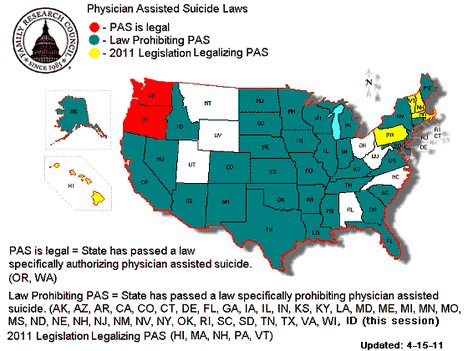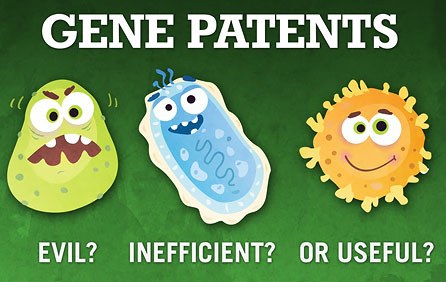|
by Nari Lee '17
0 Comments
by Elena Suglia '15 Dolphins and other cetaceans are some of the most well-loved, charismatic creatures on Earth. This stems in part from the many human-like qualities they display. Some dolphins recognize themselves in a mirror [1], call each other by name [2], and correctly identify and communicate to humans the presence or absence of objects in their tank [3]. Their intelligence intrigues citizens and scientists alike, and cetaceans have earned a reputation as some of the world’s smartest animals. by Matthew Lee '15  A map showing which US states have legalized/prohibited physician-assisted suicide. [image via] Imagine Emma Sue Schroeder, an 83-year-old terminal cancer patient who wants her doctor to prescribe lethal pills for her. Should that be legal? On April 2, Prof. Felicia Ackerman (PHIL) discussed the above scenario in a Science Café hosted by The Triple Helix called “The Double Standard in Physician-Assisted Suicide.” Ackerman is well-known as the writer of well over a hundred letters to the editor in The New York Times and as the writer of a column in The Providence Journal. Ackerman teaches PHIL0030 “Skepticism and Knowledge” and PHIL0880 “Ethical Themes in the Contemporary American Short Story.”
Ackerman argued that, out of respect for Rachel’s autonomy, it should be legal for lethal pills to be prescribed to Rachel and contended that government should not deal in morality. by Sadhana Bala '17  Human embryonic stem cells. [image via] In the United States, the biomedical significance of human embryonic stem cells (hESC) is recognized by Democrats and Republicans alike. Every passing month brings reports of the newest successful application of embryonic stem cells to a specific medical cause. hESC therapy has been used to further research on a wide variety of ailments – including spinal cord injury, multiple sclerosis, infertility and even hearing loss (1) – and it has generated largely promising results.
The controversy with hESC research does not center on the results but the methods – a moral dilemma that has been greatly debated in the media for years. Embryonic stem cells are derived from four- to five-day-old blastocysts, hollow balls of cells that represent the beginning stage of human embryo development. The extraction procedure often results in the destruction of a human embryo, usually one that has been voluntarily donated in a fertility clinic. But the huge potential of these cells has caused scientists, politicians, and the general public (2) to come to terms with this fact. Over the last two to three years, embryonic stem cells have, more or less, crawled off the agenda of the general media. Government-sponsored research for embryonic stem cells is currently at a pinnacle, yet it remains hindered due to one small piece of decade-old legislation by Gordon Wade '15 The answer to this seems obvious – no one owns life. It just is. Or in the case of livestock, plants, and pets, maybe one can own it. But can you claim ownership over an entire species or strain? Should individuals and companies be allowed to patent particular genes? What about genetically modified organisms? Or entirely synthetic organisms?
These questions are relevant in the current scientific landscape of genetic engineering and synthetic biology. The topic of intellectual property and genetics has only recently gained traction in United States courts and popular awareness. by Katie Han '17 
Don't you just love the solar system? [image via]
Space is fascinating. Every child is bound to fall in love with the idea of flying on a sleek rocket to journey away from Earth. And at at least one reflective point as a teenager, that child will probably ponder the insignificance of human beings in this vast, endless universe filled with myriads of galaxies and will realize that we are essentially “specks.” Inspired by this sense of wonder, some will carry this passion into their careers, traveling out to space themselves, or building rockets and robots that do so.
One of the leading space agencies in the world, the National Aeronautics and Space Administration (NASA) currently has over 150 missions that range from monitoring Earth via satellites, sending humans to space, studying other planets in the solar system, and exploring the universe. The technology for launching rockets is developing dramatically over the years, yet sharing of such information between countries has always been sensitive. Affluent, developed countries often join the competitive “space race” to show off their scientific advancement, while the unspoken race for power has aroused a deep fear of application of this knowledge for military purposes. by Michael Golz '17  McMurdo Research Station in Antarctica, McMurdo Research Station in Antarctica,closed during the shutdown. [image via] The government shutdown was a political nightmare that had dire economic consequences. But there was resounding fallout in research and health studies as well that lead to troubling questions about the place of the public sector in critical scientific endeavors. Among the affected operations was the National Cancer Institute, which had to furlough 80% of its workers and suspend operations such that most new patients looking to enroll in treatment trials were refused (1). The Food and Drug Administration even ceased some food inspections. Drastic results were felt at the Center for Disease Control where although the emergency centers and processing labs were still operational, the organization was working at 30% capacity, with 70% of its workforce sent home (1). The U.S. Department of Health and Human Services reported that “the agency's ability to prepare a response to emerging outbreaks, including the H7N9 flu outbreak or the Middle East Respiratory Syndrome (MERS) outbreak could be delayed (2).” But fear not, standard protocol called for the maintenance of a fully operational National Weather Service (2)… |


